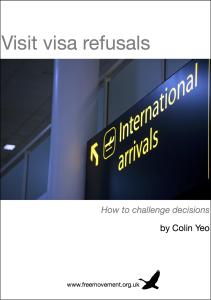- BY Colin Yeo

Refusal rate for family visit visas jumped after appeals abolished
THANKS FOR READING
Older content is locked

A great deal of time and effort goes into producing the information on Free Movement, become a member of Free Movement to get unlimited access to all articles, and much, much more
TAKE FREE MOVEMENT FURTHER
By becoming a member of Free Movement, you not only support the hard-work that goes into maintaining the website, but get access to premium features;
- Single login for personal use
- FREE downloads of Free Movement ebooks
- Access to all Free Movement blog content
- Access to all our online training materials
- Access to our busy forums
- Downloadable CPD certificates
The refusal rate for family visit visa applications jumped by 6 percentage points in the period after abolition of appeal rights in July 2013.
This ought to come as no surprise. As Tony Blair once said (Hansard vol 213, col 43, 2 November 1992):
When a right of appeal is removed, what is removed is a valuable and necessary constraint on those who exercise original jurisdiction. That is true not merely of immigration officers but of anybody. The immigration officer who knows that his decision may be subject to appeal is likely to be a good deal more circumspect, careful and even handed that the officer who knows that his power of decision is absolute. That is simply, I fear, a matter of human nature, quite apart from anything else.
It is, of course, disappointing nevertheless. What will happen when rights of appeal are curtailed under the appeal provisions of the Immigration Act 2014?
The data was released following a Freedom of Information request and appeal. The full data was as follows:
| Period | Refused |
| July 11 – Jun 12 | 18% |
| July 12 – Jun 13 | 19% |
| July 13 – Sept 13 | 25% |
If you are affected by one of these refusals, I’ve put together an ebook guide to challenging visit visa refusals which is available for download. It is intended for members of the public but lawyers might be interested as well.
[purchase_link id=”14398″ style=”button” color=”green” text=”Buy now” direct=”true”]SHARE



8 responses
It might me a good idea to also look at the jump in refusals by country. You previously highlighted the doubling of refusals for Syrians. Might be interesting to see whether there are identifiable patterns in refusals of visit visas in terms of nationality, age, gender and purpose of visit.
I do, however, have a day job… I’m always happy for people to suggest yet more work and blogging for me to do, but I’m even happier if people offer to help…
I’m here for you Colin ;-)
I don’t know what’s more surprising, that it was only a 6% increase or you championing the words of Tony Blair?
Whilst the number of overstayers is pretty staggering (some of whom go on to become asylum and deportation cases), the ending of family visit visa appeals does strike, even me, as a draconian sledgehammer.
Even more eye watering is the new power to veto positive bail decisions (turning some bail hearings into a bit of a farce) as Colin likes to say, more work for them pesky “immigration lawyers”, at least we are keeping the day job busy Colin.
I think the percentage rise is actually higher, as many applicants no longer submit an application as a family visit since the right of appeal was removed. There is no longer any advantage in doing so.
The imminent removal of the rest of appeal rights, the resignation of John Vine. Pretty soon there will be no oversight. The case of Radha Naran Patel v Secretary of State for the Home Department [2014] EWHC 501 (Admin) (30 July 2014) is illustrative of what can go wrong. The removal of appeal rights and the increased cost of Judicial Reviews will inevitably reduce the oversight of decision makers and officers and lead to greater abuses. The quality of visit visa refusals has in my opinion declined since the removal of appeal rights and they were not great to begin with. The ECO’s and civil servants have a difficult job as it is processing large numbers of applications. There will always be a tendency for some of them to cut corners. The reduction in appeal rights will lead to poorer quality decisions and a greater tendency towards abuse of power.
“Resignation” of John Vine, sacking of Dominic Greive, election less than a year away, you actually think this was a resignation Julian?
A fabulous real-life example of “absolute power corrupts absolutely.” Not that we didn’t have enough of those as is, mind, but there you have it.
John Vine quoted in the independent
Asked about the controversy surrounding the Government’s immigration vans he says, “It’s important that I don’t engage in that wider debate”. But then he smiles and tantalisingly adds: “Certainly as long as I remain as the independent chief inspector.”
I wonder what else he might comment on when he is no longer the independent Chief Inspector?